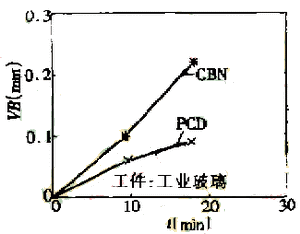
Privacy statement: Your privacy is very important to Us. Our company promises not to disclose your personal information to any external company with out your explicit permission.
The CBN-L, cBN-W and diamond composite blade PCD-D are used to turn the hard tool steel T10A (HRC60~63), and -L, -W, -D respectively represent the manufacturer. Tool geometry parameters: g 0 =0°, g 0l = -20°, b g = 0.2 mm, k r = 45°. . r e = 0.5 mm (CBN), 4 mm (PCD). Cutting amount: a p = 0.1 mm, f = 0.05 mm / r, V = 84 m / min. The tool wear curve is shown in Figure 1.
The T10A was cut with a cemented carbide YM053 blade and a Si 3 N 4 based composite ceramic blade. g 0 = -8°, g 0l = -20°, b g = 0.2 mm, k r = 45°. . r e =0.5 mm, a p =O.1 mm, f=0.05 mm/r, V=44 m/min. The tool wear curve is shown in Figure 2. It can be seen from Fig. 1 and Fig. 2 that the effect of machining hardened steel with CBN composite blade is very good, and the effect of cutting hardened steel with diamond composite blade PCD is very poor. Carbide and ceramic inserts cut T10A at lower cutting speeds (V=44m/min), and tool durability is significantly lower than CBN tools.
Fourth, the cutting of cemented carbide
Industrial glass (SiO 2 +Na 2 O+CaO, HV40O-500) was turned with PCD and CBN inserts. The tool geometry is the same as in Figure 1. a p = 0.1 mm, f = 0.05 mm/r, and V = 38 m/min. The test results are shown in Figure 4. The cutting results are good. And PCD leads.
6. Cutting of engineering ceramics
 Figure 4 Superhard tool turning industrial glass |  Figure 5 superhard tool turning engineering ceramics |
For cutting high-hardness materials, the tool material must have high hardness and elastic modulus. Superhard materials are very suitable for this, which is a match of mechanical properties.
The tool material should be inert to the material of the workpiece in the chemical building. Otherwise, the wear rate of the tool is high. Therefore, diamond tools are not suitable for cutting iron-based materials, such as hardened steel. This is a match of chemical properties. CBN is the best knife material for fine-cut hardened steel.Cutting industrial glass and engineering ceramics with diamond tools is also very effective.
Previous page
November 18, 2024
November 11, 2024
Envoyer à ce fournisseur
November 18, 2024
November 11, 2024

Privacy statement: Your privacy is very important to Us. Our company promises not to disclose your personal information to any external company with out your explicit permission.

Fill in more information so that we can get in touch with you faster
Privacy statement: Your privacy is very important to Us. Our company promises not to disclose your personal information to any external company with out your explicit permission.